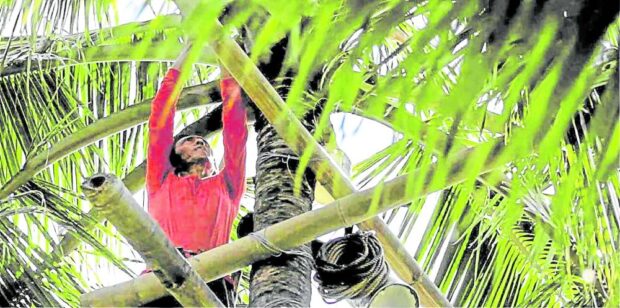Gov’t vows to revitalize coco industry

MODERNIZATION About 2.5 million small farmers are expected to benefit from the Coconut Farmers and Industry Development Plan. —INQUIRER FILE PHOTO
MANILA -The government is moving to enhance capacity-building initiatives for coconut farmers as part of efforts to revitalize the local coconut industry, according to the Philippine Council for Agriculture and Fisheries (PCAF).
In a statement, PCAF said the Agricultural Training Institute (ATI) and the Technical Education and Skills Development Authority (Tesda) had been tasked to reevaluate the skills requirements of the sector to improve farmers’ livelihood and productivity.
During a meeting convened by the National Sectoral Committee on Coconut, they recommended the creation of a technical working group to develop and harmonize such programs.
Tesda’s Yvette Joy Lazada said the agency was willing to facilitate the development of programs without existing training regulations with the help of industry players.
Training regulations refer to “the competency standards for a national qualification, containing the competency-based curriculum, instructional materials and competency assessment tools,” according to PCAF, an attached agency of the Department of Agriculture (DA) that facilitates broad-based participatory processes in the agriculture and fisheries sector.
ATI deputy director Antonieta Arceo said their training programs were anchored on the training needs assessment provided by the Development Academy of the Philippines. It also supports the DA’s seed distribution.
“For example, there is a scheduled distribution of seeds or dairy animals, then the trainings to be conducted in the area will be about seed and dairy,” Arceo said.
Arceo said another training assessment would be conducted later this year. This would aid them in crafting the programs for 2024, she added.
Meanwhile, Lazada presented the 2023 work and financial plan along with the programs and initiatives under the Coconut Farmers and Industry Development Plan (CFIDP).
This includes the coconut farmers scholarship program and the listing of initially identified skills requirements as validated by the Philippine Coconut Authority (PCA). There is an ongoing PCA survey to determine the priority qualifications/skills in every region.
The CFIDP lays out various programs and projects needed to rehabilitate and modernize the industry, benefiting 2.5 million small farmers nationwide. This serves as the basis for tapping the controversial P75-billion coco levy fund.
In 2022, coconut output increased by 1.45 percent to 14.93 million metric tons (MT) from 14.71 million MT a year ago, according to the Philippine Statistics Authority. The country produced 3.4 million MT of coconut in the second quarter of this year, down by 1.5 percent from 3.5 million MT. Further, coconut oil exports stood at $2.1 billion in the previous year, an increment of 46.7 percent from $1.4 billion in 2021. INQ
RELATED STORIES:
Bongbong Marcos aims to boost coconut industry with tech investment
